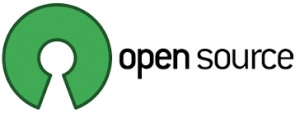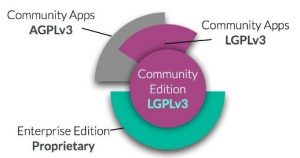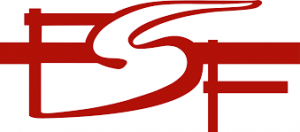Like other businesses that implement/design digital solutions and products we have run into the lack of knowledge of the general public against the differences between Libre Software, Open Source and Freeware, as well as these make a difference between a service and a product.
Software unlike most fixed assets or physical equipment, have legal properties that accompany them in their use, these properties can make a huge difference in their implementation and in most cases is not related in any way to the cost or price of said software.
We would like to take a moment to make this distinction and help to understand what each of them means.
Let’s start briefly with something basic,
What is Software?
Software or better known as (computer) programs in Latin America is,
the set of necessary logical components that make possible to perform specific tasks
In a simple way we can see a software as a digital tool to perform activities with different levels of complexity.
Gratis Software / Freeware
 The software called freeware or some times refered as shareware, does not offer more information in its name than the financial cost is $ 0 (zero). However, the legal conditions of their use are usually disproportionate at their cost.
The software called freeware or some times refered as shareware, does not offer more information in its name than the financial cost is $ 0 (zero). However, the legal conditions of their use are usually disproportionate at their cost.
Many times we find programs that while they are for personal use do not have any cost, but they can be prohibited for productive, commercial or research purposes, and it is necessary to acquire some type of license, contract or in few cases restricted to said uses with no alternative at all.
Not all gratis/freeware imposes these policies, however they make this kind a minefield for commercial and productive activities.
Open Source 
Over time, the free software movement was diluted due to the popularity and convenience that the term Open Source presented to companies and businesses.
The Open Source Initiative (OSI) coined this term to reduce the fear of large companies and consortiums to invest in software that shared a very clear similarity with Free Software, ignoring, restricting or eliminating the user protection clause that requires maintaining the software freedom.
Open source software is mainly focused on the benefit generated by exposing the source code in a public way, promoting its use and continuous development in both a community and corporate way, however thanks to its dual license model it is very common to find a community version and a business version of the same product, sometimes known as Open Core . 
Where the business version has exclusive features and complements, with proprietary licenses whose code is not published.
This model allows to capitalize software companies which can offer specialized and extended commercial support in products, however there is a thin line between an open model without protection in software freedom and the interests of the company and its investors, making this model functional, but with possible long-term implications.
Currently we find very specific cases of business models that are identified as Open Source that have taken important steps in the design of a healthier business model as Nextcloud has done, eliminating the duality of licenses in their products, these examples are very limited and present a milestone in the business model under the concept of Open Source.
You can learn more about Nextcloud at the conference: Why I forked my own company and project by Frank Karlitschek, founder and CEO of Nextcloud.
[pt_view id = “2c7a8b67vq”]
Free/Libre Software 
The Free Software definition is maintained by the FSF , and we can summarize in the following lines:
- The freedom to run the program as desired, for any purpose (freedom 0).
- The freedom to study how the program works, and change it to do what you want (freedom 1). Access to the source code is a necessary condition for this.
- The freedom to redistribute copies to help others (freedom 2).
- The freedom to distribute copies of their modified versions to third parties (freedom 3). This allows you to offer the entire community the opportunity to benefit from the modifications. Access to the source code is a necessary condition for this.
The difference between free/libre and open source software in practice is almost negligible, but it is mainly based on the license and business model that is executed on its development.
Free software can be under strong or weak licenses. 
Strong licenses legally keep the liberties that the author assigned to the software and its users as well as derivative programs from being lost, ensuring that the software is free (as in free speech) at the time of publication and maintain those properties regardless of the number of authors and modifications and derivations under which it has been submitted, this practice is known as a copyleft license.
On the other hand the weak or permissive licenses of free software do not require that the license of said software keep the same rights, since this can have a change of license removing some of the 4 freedoms or all at the same time, with the possibility of becoming a proprietary license software, this effect is present in many of the licenses approved by the OSI .
Free software focuses its attention on issues of ethical and social-technological nature, since by ensuring these freedoms the software becomes a tool at the service of users and not an instrument of control or espionage by developers or corporations, allowing autonomy, security and privacy for the computing of users, may they be individuals, companies or governments. 
We find that one of the most explored models in the free software market is under the support and maintenance on demand as well as extended supports and even when it is an effective model, there is a lot of skepticism in the creation of ethical business models that respect the 4 essential freedoms of free software.
Conclusions

Today’s economy is in great demand for IT solutions today. As time progresses, more and more businesses and companies turn to digital solutions for the automation of their systems and processes, in the same way globalization has created bridges of supply and demand throughout the world.
We believe that private and public initiatives can benefit greatly thanks to the market offered by companies and businesses based on free/libre and open source software that, unlike freeware, offer more benefits and guarantees than just the temporary benefit of the initial price.
In this sense it is simply summarized with the proverb,
You get what you pay for
In Software, IT & Networks Ltd , we specialize in the implementation of free software and open source solutions and platforms, mainly due to the growth potential and optimization of resources that these systems, services and platforms offer to businesses in search of a development approach sustained.
Allowing these businesses to compete with the local and global market in constant expansion, likewise cooperate in the creation of a culture of consumption and investment in technologies with ethical and sustainable principles that allow technological and social advancement. 

